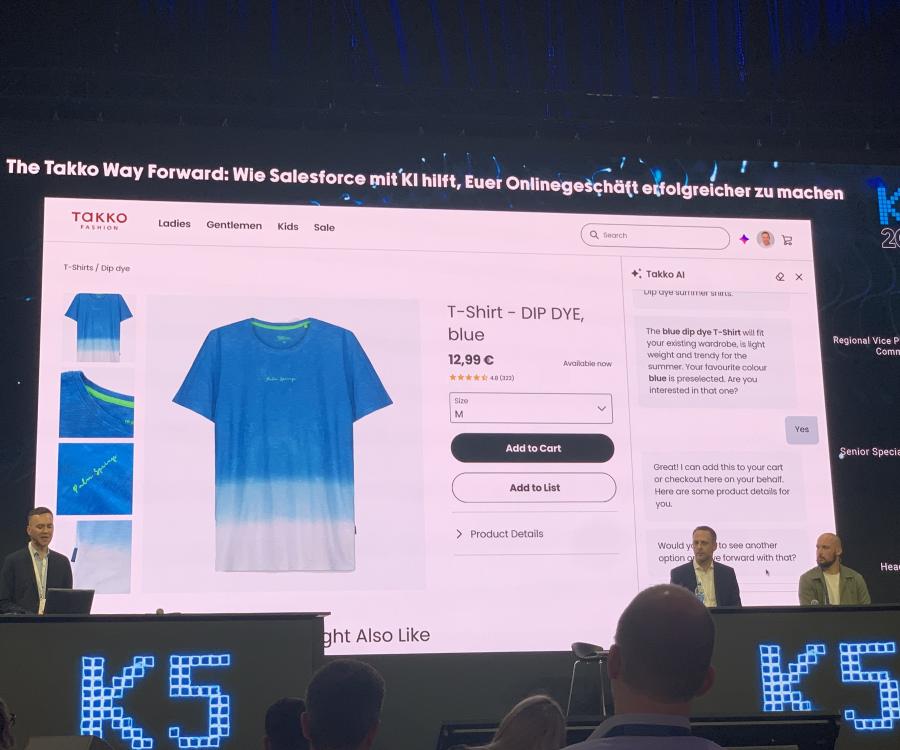“Customer loyalty has changed a lot in retail, especially in the fashion industry,” says Dominik Olejko. He is an expert in this field and provides valuable insights into the challenges and opportunities arising from technological developments and changing customer behavior. How has customer loyalty changed? Why is a well thought-out omnichannel strategy crucial for success? What are the upcoming trends? What significance do artificial intelligence, augmented reality, sustainability and transparency have? These answers and more can be found in the interview.

How do you define customer loyalty in today's retail sector and specifically in the fashion industry?
Dominik Olejko: Customer loyalty has changed a lot in retail, especially in the fashion industry. Technological developments have given customers access to quick price comparisons and product selections on different platforms, which reduces loyalty to a brand. But the big players from Asia are also changing. Even the fast fashion environment is evolving into ultra-fast fashion, which makes the competition for customer loyalty even more difficult. On top of it, traditional loyalty programs are evolving to include more than just discounts. Exclusive access to new collections, personalized offers, and unique experiences are now integral to retaining customer loyalty.
What do you think is driving this?
It has to do with the fact that the price perspective on fashion has changed. There are two types of customers: The price-sensitive, who only want the product for one season and then exchange it for another, more fashionable one, and the quality hunters, who value sustainable and high-quality products that they can wear for longer. The latter are also the growing group of customers who are starting to look at labels.
The driving force behind these trends is a dynamic shift in consumer values and expectations. Success factors for customer loyalty are personal interactions and conveying the feeling of being valued and understood. . A major trend is the development of communities. Customers should not only buy the brand, but also be able to interact with other brand buyers and inspire each other.
In essence, loyalty is no longer just about the product but about the entire brand experience. Brands that can create a sense of community and offer personalized experiences are the ones that stand out. This holistic approach to customer engagement is what truly drives modern consumer loyalty.

Why is omnichannel so important for retailers today? What are the benefits of a well-thought-out omnichannel strategy for customers and companies?
In today's fast-paced retail environment, meeting customers where they are – across various platforms and touchpoints – is essential for maintaining a competitive edge. If you are only strong in one channel, it is much more dangerous to lose your customers to another brand. A well-integrated omnichannel system that includes a powerful app, for example, allows customers to receive personalized offers and interact with the brand easily.
An effective omnichannel strategy has numerous benefits for customers. It saves them time by facilitating access to products and information across different channels. This leads to a more efficient shopping experience where customers can quickly fulfill their needs. This, in turn, encourages browsing and discovery of new products, which increases the likelihood of customers lingering longer and buying more.
Additionally, a positive omnichannel experience boosts customer satisfaction and loyalty, leading to increased word-of-mouth recommendations. This is invaluable marketing, as it is both cost-effective and highly trusted.
What factors do you think play a role in developing and implementing a successful omnichannel strategy?
As customers increasingly use different channels for a transaction, from online browsing to in-store trial to final purchase via an app, these channels need to be seamlessly connected to provide a consistent and personalized experience. Accurately capturing customer preferences and using this information to make relevant offers is crucial. Additionally, integrating technology effectively, maintaining consistent branding, and ensuring smooth logistics are key factors in creating a successful omnichannel strategy.
Is it enough for me as a retailer to look at the collected customer data?
A simple algorithm system is no longer enough. Instead, data should be used to create personalized recommendations based on actual purchase histories. Predictive analysis plays a central role here. It can be used to anticipate customers' future needs and make proactive offers.
What else is important besides digital data?
Beyond digital data, empowering employees through continuous training is essential, enabling them to fully utilize new tools and features. These employees are vital brand ambassadors who add a human touch to the technological interface, significantly enhancing customer experience.
The main challenge is to provide it across all channels. Whether the contact is happening on social media, in the app, or in the store. People will remain at the core of this strategy, driving engagement, satisfaction, and loyalty through every interaction.
A look into the future: what trends do you see in customer loyalty and omnichannel strategies in the coming years?
Imagine walking into a store where your every preference and past purchase are instantly recognized. In the coming years, up to 80% of customer interactions are expected to be controlled by AI. This signifies a transformative shift towards automated yet deeply personalized customer services. Companies must ensure that AI integration maintains their brand DNA while enhancing personalization, creating an experience that feels both unique and familiar.

Instead of guessing sizes and styles while shopping online, you step into a virtual fitting room through augmented reality (AR). The use of AR is set to increase, particularly with virtual fitting rooms and smart mirrors. These technologies will revolutionize the shopping experience, allowing you to see how products look and fit on you before making a purchase. They also help to increase customer satisfaction and return rate.
But the future of retail isn’t just about technology, it’s also about values. Another important trend is the focus on sustainable practices and transparency in the supply chain. Imagine buying a dress and being able to trace its journey from the cotton fields to your closet, ensuring every step was environmentally friendly and ethically sound. Consumers will increasingly seek these sustainable and ethical options, driving companies to adopt more responsible practices.
This also poses challenges for the sector. What do retailers need to be prepared for?
It is important to strike a balance between technological progress and data protection. While personalization through technology is increasing, brands must ensure that they comply with legal data protection regulations and maintain customer trust. Technology can also lead to increased costs without immediate ROI. Retailers need to justify long-term investments in customer loyalty while taking into account the cost of maintaining technology. In addition, the human factor in retail is becoming increasingly important as customers will continue to value personal interactions despite technological advances. Companies must therefore consider both technological and human elements to optimize the customer experience and strengthen customer loyalty.
Another personal question: If you are a customer now, what is an absolute no-go for you in a customer journey? And what is something that you personally enjoy when shopping?
First, a lack of transparency, especially regarding the origin and manufacture of products, is an absolute no-go for me. When brands hide essential information or fail to uphold transparency standards, they jeopardize their reputation and trust.
As the saying goes, "In the age of information, ignorance is a choice." So, ignorance of technological advancements is also a significant no-go.
On the flip side, I thoroughly enjoy exclusive offers and membership programs that offer more than just discounts. Programs that provide additional points for specific activities or create a sense of belonging truly stand out. Dynamic, personalized content also grabs my attention—such as a newsletter that updates with the latest offers every time I open it, based on my previous searches.
Despite my love for technology, I deeply value the human touch in the shopping experience, especially in areas where personal interaction is key. The perfect blend of cutting-edge technology and authentic human connection is what makes a shopping experience unforgettable.









